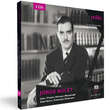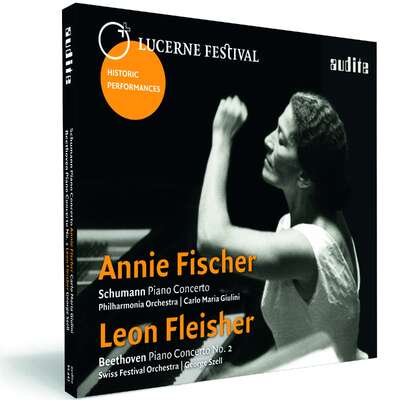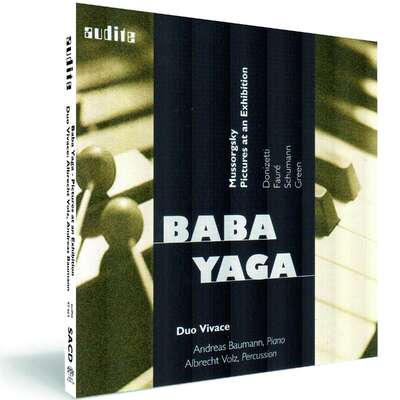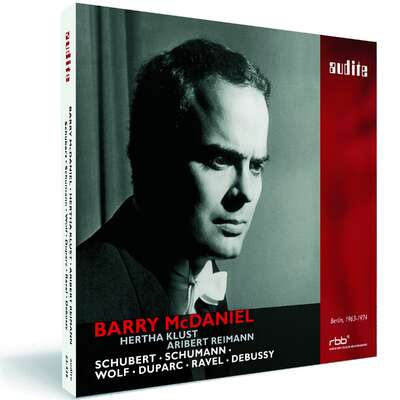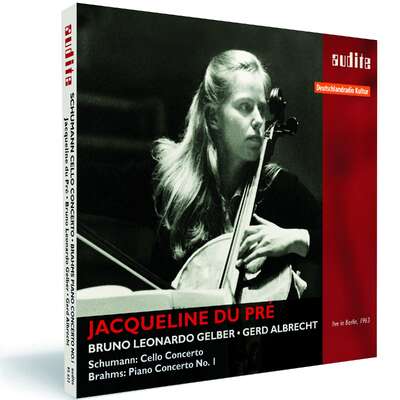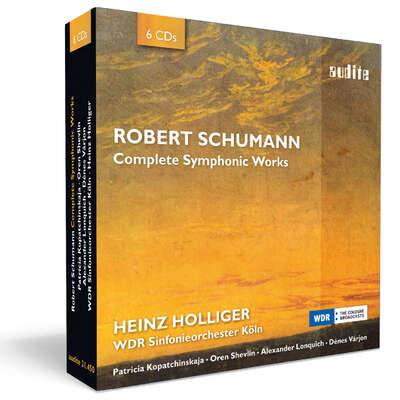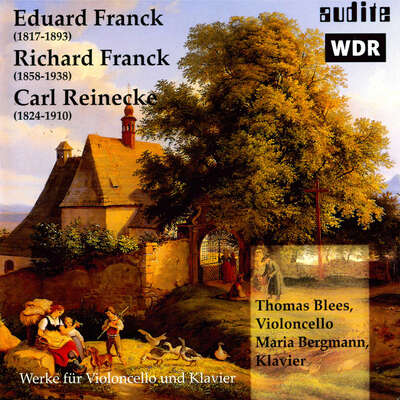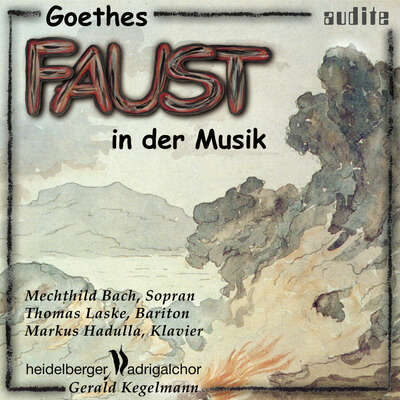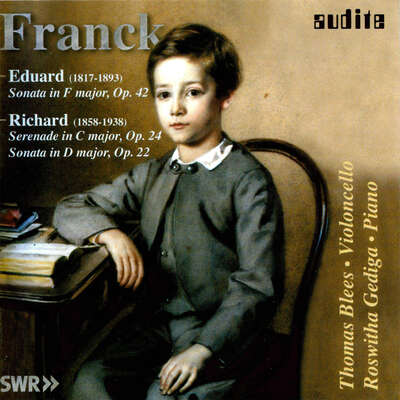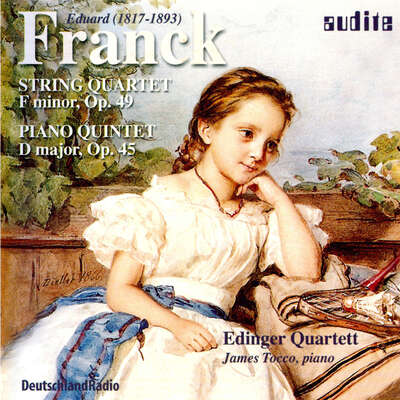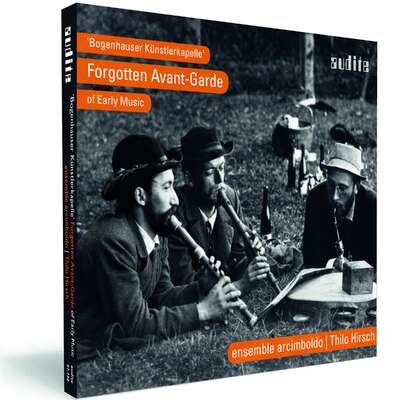
Jorge Bolet, the last gentleman of the piano, demonstrates his pianistic and musical authority in RIAS recordings from 1962–73 featuring great piano works by Chopin, Liszt, and Debussy together with encores and arrangements by Moszkowski and Godowsky.more
"There is real treasure trove here, and no pianophile should miss this set." (Classic FM)
Track List
Details
| Jorge Bolet: The RIAS Recordings, Vol. I | |
| article number: | 21.438 |
|---|---|
| EAN barcode: | 4022143214386 |
| price group: | BCT |
| release date: | 3. November 2017 |
| total time: | 186 min. |
Bonus Material
Informationen
Jorge Bolet - the last gentleman of the piano
Cuban-American pianist Jorge Bolet (1914-1990), misleadingly labeled the "last Romantic" among 20th century pianists and marketed under this title when he achieved world fame at the end of hiscareer, was first and foremost a gentleman of the piano. Few pianists interpreted the great piano music of the 19th and early 20thcenturies with such unerring stylistic assurance and technical mastery that was at the same time completely free of vanity and striving for effect. Rather than vague sentimentality, Bolet - who studied at the world-renowned Curtis Institute of Music in Philadelphia with David Saperton, son-in-law of the legendary pianist Leopold Godowsky, and later succeeded Rudolf Serkin as director of ist piano department - sought a balance between musical and pianistic intelligence. Thanks to these qualities, his recordings, which include not-uncontroversial transcriptions from the golden age of piano playing before 1914, are considered benchmarks. These recordings for the RIAS Berlin from 1962-73, featuring works by Chopin, Liszt, and Debussy alongwith highly virtuosic encores and arrangements by Moritz Moszkowski and Godowsky (among others), are no exception: here we experience a pianist and musician who rightly occupies aplace among the pantheon of great pianists.
All the recordings in this three-CD box set are first releases from the master tapes.
Appearing soon, the follow-up CD broadens the selection to include concerto repertoire (concert recordings of Liszt's piano concertos with the RSO Berlin under Lawrence Foster / Edo de Waart); it also presents further great piano works by the composer (Tannhäuser Paraphrase, Années de pèlerinage. Deuxième année. Italie). The stereo recordings were made in 1971 and 1982 and offer testimony of the "late" Jorge Bolet.
Reviews
Fono Forum | Juli 2019 | Ingo Harden | July 1, 2019
Drei von drüben
lngo Harden zu neuen alten Klavieraufnahmen
[…] Auch die Berliner Rundfunk-Aufnahmen von Jorge Bolet (1914-90), denen Audite eine dreiteilige Serie gewidmet hat, sind in dieser Hinsicht nichtMehr lesen
Musik & Theater | 07/08 Juli/August 2018 | Werner Pfister | July 1, 2018 Gentleman am Flügel
Die vorliegenden RIAS-Einspielungen indes stammen noch aus einer Zeit, als Jorge Bolet nur Insidern ein Begriff war, aus den Jahren 1962 bis 1966. Das macht diese Dokumente besonders wertvoll. Sein Spiel wirkt in jedem Takt ehrlich, eloquent und sozusagen sprechend – gleichsam «modern». Ein ernster, zuweilen auch ein strenger Sachwalter am Flügel, dem es vor allem um Verdeutlichung der kompositorischen Strukturen zu tun war.Mehr lesen
Fanfare | July/August 2018 | Peter J. Rabinowitz | July 1, 2018
According to traditional lore, Bolet’s Carnegie Hall concert on February 25, 1974, was, as Wolfgang Rathert puts it in the notes for this new set,Mehr lesen
Some of those have been lovingly resurrected by APR and especially Marston (see, in particular, Henry Fogel’s and Marc Medwin’s detailed accounts of Jorge Bolet: Ambassador from the Golden Age, Fanfare 38:5). Now Audite has launched a series drawn from RIAS archival broadcasts from the decade just before that Carnegie Recital, and it’s another cause for celebration.
What are the primary virtues on display? Certainly, in terms of virtuosity, the pianism here is at the top level. In his paradoxically grudging rave of that Carnegie concert, Harold Schonberg commented that Bolet had “a technique equal to any in the world today.” Listening to his dexterity in the Liszt Rhapsodie espagnole, you certainly wouldn’t be moved to disagree. But while the performance is marked by the same kind of sizzling authority we hear from, say, Barere (see 13:3), it’s got a lot more than muscle to recommend it—as do all of the other performances on this well-curated set.
Indeed, even more consistently striking than the virtuosity is Bolet’s long-term rhetorical control. Despite the frequent rhythmic freedom, and despite the garrulousness of some of the works (you’d hardly charge Liszt’s Vallée d’Obermann with concision), Bolet keeps us in his grip from first note to last, unfolding the music in a single emotional arc. Then, too, there’s his iridescent play of color and articulation. That’s true not only in such intimate music as his gracious “Danseuses de Delphe” but in larger works as well: Few pianists bring out the timbral implications of the changes of harmony in Liszt’s “Harmonies du soir” as evocatively as Bolet does here, and few manage Chopin’s Fantasy with such a paradoxical blending of plush and granite. Throughout the recital, ornamentation is artfully molded—and in contrast to many of Bolet’s late performances, accompaniments never turn sludgy. There’s no trace, either, of the sobriety that sometimes reduces Bolet’s later readings into lectures—indeed, the level of wit on this recital is deliriously high.
On the whole, I think you could say these are extroverted performances—the unflinching concentration in Liszt’s “Chasse-neige,” the stunning crescendo in the middle of Debussy’s “La cathédrale engloutie,” the barnstorming account of Godowsky’s Metamorphosis on Fledermaus all remind us that we are in the presence of an artist who thinks big. On the whole … but not wholly. For in contrast to Barere (and Lazar Berman, too), Bolet never brutalizes the music—and he’s got a far wider interpretive range, coupled with far more responsiveness to the emotional differences among the pieces. In the end, for every moment of sheer bravura, there’s another that caresses your ears. The free and innocent ardor of Widmung, the surprisingly inward opening of Chopin’s Second Impromptu, the mercurial changes of voice of Debussy’s Sérénade interrompu, the utter transparency of the counterpoint in Godowsky’s arrangement of Saint-Saëns’s “The Swan”—this set is dotted with moments of remarkable sensitivity, even in places where you might not expect it (say, the pockets of delicacy in Liszt’s usually coarsened “Wilde Jagd”).
Does everything work? Actually, pretty nearly. And in those few moments where you might demur, there’s always something to compensate. The reading of Liszt’s La chapelle de Guillaume Tell is slightly static in a way that looks ahead to the later Bolet, but the balance of the sonorities is a marvel; Moszkowski’s En automne may be slightly pushy, but its prismatic filigree makes your slight sense of dissatisfaction seem churlish.
The engineering is superb, and the notes, while no competition for the essays in the Marston set, are informative and appreciative. All in all, a superlative contribution to the catalog.
Fono Forum | Mai 2018 | Ingo Harden | May 1, 2018
Klingende Nachlässe
Wiederveröffentlichungen historischer Klavieraufnahmen
Seit Decca Anfang der 80er-Jahre begann, ihn eine Art klingende Bilanz seines Wirkens ziehen zu lassen, ist Jorge Bolet (1914-90) auch bei uns einMehr lesen
In Deutschland war Bolet oft zu Gast, zuerst 1935, dann wieder bald nach dem Krieg. Audite hat jetzt in zwei Bänden Rundfunkaufnahmen erstveröffentlicht, die der RIAS zwischen 1962 und 1982 mit ihm gemacht hat: Chopin, Debussy-Preludes, vor allem aber Liszt und Virtuoses bis hin zu den Fledermaus-Metamorphosen von Godowsky. Umstürzende neue Einsichten zu Bolet bringen die vorbildlich von den Originalbändern übertragenen Produktionen nicht. Anders als viele andere Ausgrabungen unserer Tage sind sie aber weit mehr als diskografische Ergänzungen aus der "Ferner-liefen"-Schublade, sie bilden so etwas wie ein neues Kernstück von Bolets klingendem Nachlass. Denn im Unterschied zu den zunehmend kontemplativ-gewichtigen Interpretationen des Sechzigers und Siebzigers stammen sie aus den "besten Jahren" des Pianisten, verbinden die für ihn zeitlebens charakteristische Rundung des Tons und seinen untrüglichen Formsinn mit einem gesunden Schuss feurigen Zugriffs: ein berücksichtigenswerter neuer Baustein für jede pianistische Basis-Diskothek.
[…]
www.classical.net | 11.04.2018 | José Luis Bermúdez | April 11, 2018 | source: http://www.class...
As is usual with releases from Audite, the general production values are first rate. The nicely produced box includes a long essay by Wolfgang Rathert and full recording details. The sound quality is also very good, and certainly good enough to appeal beyond historical recording enthusiasts.Mehr lesen
Diapason | N° 667 AVRIL 2018 | Laurent Muraro | April 1, 2018 | source: http://www.clicm...
Bolet avant Bolet (comprenez avant le récital mythique de Carnegie Hall) nous est désormais mieux connu, songeons seulement aux volumes récentsMehr lesen
De l’électricité, il y en aura en revanche dans une lecture héroïque du Concerto n° 1 en public à l’automne 1971, mais beaucoup moins dix ans plus tard dans le Concerto n° 2, la faute sans doute à l’orchestre de la Radio de Berlin, beaucoup plus routinier sous la baguette d’Edo De Waart qu’avec Lawrence Foster. Quant aux Sonnets de Pétrarque, là encore, on aura tendance à leur préférer la version Decca postérieure, mieux captée et surtout plus chantante.
On retrouve les Années de pèlerinage en ouverture d’un deuxième volume plus copieux, avec une Suisse dont le principal défaut est d’être incomplète. Pourquoi avoir intégré à cette anthologie les sessions de mars 1962, avec un tabouret qui grince, un piano qui ferraille, et une prise de son désastreuse ? La sélection de Transcendantes en fait les frais. Bien plus intéressante, une intégrale des Liebesträume, legatissimo à souhait, ouvre un deuxième disque dont les plats de résistance seront une Rhapsodie espagnole vigoureuse et surtout les Métamorphoses symphoniques de Godowsky, datées toutes deux de mars 1964. Mieux captées que dans l’anthologie Marston, celles-ci nous montrent Bolet sous son meilleur jour, campant en un instant tous les personnages de La Chauve-Souris, jouant à merveille des variations de tempo pour nous faire valser.
Chopin et Debussy se partagent un dernier disque, et on a plaisir à découvrir Bolet dans une intégrale des Impromptus remarquable, où les doigts filent sur le clavier avec une incroyable légèreté (1964, même session que pour la Rhapsodie et Godowsky). Chez Debussy, la touche très claire imprimée par Bolet nous a toujours convaincu. Certains Préludes y gagnent, comme cette Cathédrale engloutie aux accords ronds et pleins et aux couleurs changeantes, et surtout cette Ondine encore plus insaisissable qu’une fille de Rhin, ou des Feux d’artifice à donner le vertige. Une somme inégale, impossible à noter, où les fans de Bolet trouveront leur compte.
Piano News | 2/2018 März/April | Carsten Dürer | March 1, 2018 Ungewöhnliche Sichtweisen
Bolets Liszt-Spiel war bekannt, und entsprechend weiß er auch in dieser Einspielung brillant zu überzeugen. Anscheinend war ihm die Gedanken- und Gefühlswelt Liszts so nahe, dass er seine Werke so unnachahmlich empathisch zu spielen verstand. Da ist kein aufgesetztes Pathos zu hören, keine Gefühlsduselei. Bolet ist in diesem Moment Liszt. Mehr lesen
www.classicalcdreview.com | March 2018 | R.E.B. | March 1, 2018 | source: http://www.class...
Here is an opportunity for collectors to hear live performances by one of the major past pianists in repertory close to him.Mehr lesen
www.musicweb-international.com | Wednesday February 28th | Jonathan Woolf | February 28, 2018 | source: http://www.music...
Though he won the Naumberg Competition in 1937, Jorge Bolet wasn’t to achieve a modicum of fame until he ‘stood in’ for Dirk Bogarde in SongMehr lesen
He performs excerpts from Liszt’s Années de Pèlerinage and Études d’exécution transcendante in 1962-63. La Chapelle de Guillaume Tell is nobly chorded, Au lac de Wellenstadt deeply evocative and digitally superb, Orage powerfully projected and Valée d’Obermann variously delicately nuanced and dramatically expressive. The sound quality in the 1962 Études is slightly less impressive than in the Années de Pèlerinage but interpretatively things are on much the same level; deeply musical, and never overbearing with the thrills and spills of a live performance fully conveying his vision. The second disc includes more Liszt; the three Nottornos, of which Liebesträum No.3 is the obvious favourite – it’s played with chaste lyricism and no straining for effect – but which witnesses a lovely performance of the seldom encountered No. 1. Rhapsodie espagnole is dispatched with bravura. Thereafter one encounters Moszkowski’s En automne, a Bolet favourite, a skirling character study, the Saint-Saëns-Godowsky The Swan and the delicious Godowsky Le Salon. A truly beautiful performance of Widmung and an exceptionally vivid Godowsky Symphonic Metamorphosis on themes by Johann Strauss ‘Die Fledermaus’ brings the second disc to a fully contrastive conclusion.
The final disc is given over to Chopin and Debussy. The Fantasia in F minor possesses poetry and repose as well as drama and romantic authority. The Impromptus were recorded in March 1964 and are unaffected and refined and technically highly distinguished. There is the bonne bouche of the Minute Waltz and Etude Op. 10 No. 5. His Debussy is taken from the Préludes and he plays four from each book. These are conceived on much the same scale as the three overlapping performances (New York City, 1974) preserved on Marston 56003-2. Though taped earlier these Audite readings are immeasurably better recorded and preserve Bolet’s readings in far more agreeable sound. The performances are full of vivid detail and defiantly un-Gieseking like in their interpretative and sonic stance; no pedal wash.
This is a most accomplished set; well chosen, excellently engineered and finely documented with excellent photographic reproductions. Bolet aficionados should not hesitate and neither should lovers of great pianism.
Deutschlandfunk | 08.02.2018, 22:05 Uhr bis 22:50 Uhr | February 8, 2018 | source: http://www.deuts... BROADCAST Historische Aufnahmen
Sendebeleg siehe PDF!Mehr lesen
www.ClassicsToday.com | 05 February 18 | Jed Distler | February 5, 2018 | source: https://www.clas... Historical Gems: Prime Jorge Bolet From Audite
Collectors who know Jorge Bolet as the reserved and occasionally diffident elder statesman of the studio Decca recordings from his final decadeMehr lesen
Bayern 4 Klassik - CD-Tipp | "Leporello" am 22. Januar 2018, 16.05 Uhr | Oswald Beaujean | January 22, 2018 | source: https://www.br-k... BROADCAST CD-TIPP
Vor 27 Jahren, im Oktober 1990, starb in Kalifornien der amerikanisch kubanische Pianist Jorge Bolet. Er war insbesondere ein großer Interpret derMehr lesen
Für die drei Minuten, die Franz Liszts "Au lac de Wallenstadt" in Bolets Einspielung dauert, würde man einige Liszt-CDs weggeben, für die fünf Minuten, die man dem dritten Chopin-Impromptu lauscht, manche Chopin-Veröffentlichung. Wieviel Poesie und Sehnsucht spricht aus diesen Klängen, welch endlos ruhigen Atem verströmen die melodischen Linien. Selbst Liszt-Verächter müssten schwach werden, wenn Jorge Bolet spielt.
Virtuoses als Understatement
Auf Fotos umgibt den 1914 in Havanna geborenen kubanisch amerikanischen Pianisten die vornehm zurückhaltende Aura eines spanischen Granden, und genauso spielte er auch: nobel, gelassen und ohne die leiseste Attitüde. "Was mich wirklich aufregt", meinte er einmal, "sind die Pianisten, die gelegentlich ihren Kopf heben und gen Himmel richten. Wonach suchen sie, nach Gott?" Auch wenn Jorge Bolet am Flügel nicht nach Gott suchte, er spielte göttlich. Fast lyrisch introvertiert, wie ein einziges Understatement wirkt bei ihm selbst rauschhaft Virtuoses. Die äußere Erscheinung hätte ihn für eine Hollywood-Karriere prädestiniert, doch Show war das Letzte, was Bolet interessierte. Chopins Fantasie-Impromptu etwa spielte er ohne alles Virtuosengeklingel mit einer trockenen, unauffälligen Brillanz. Fantastisch perlend und doch fast wie nebenbei gestaltete er die Läufe.
Farbnuancen und dynamische Schattierungen
Bolet gehörte zu den ganz Großen, blieb aber lange unterschätzt. Erst ein grandioses Konzert in der Carnegie Hall 1974 machte den Sechzigjährigen wirklich bekannt, die Schallplattenkarriere begann noch etwas später. Dabei bietet Bolets schwereloser Anschlag in drei Takten mehr Farbnuancen und dynamische Schattierungen, als andere im Laufe eines Klavierabends zuwege bringen. Und doch bleibt alles klangvoll, rund und singend, die jetzt veröffentlichten Rundfunkaufnahmen des Rias Berlin aus den sechziger Jahren mit Werken vor allem von Liszt, Chopin und Debussy zeigen es einmal mehr. Ein knalliges Fortissimo hätte Jorge Bolet als vulgär empfunden – er brauchte es auch nicht. Als den "letzten Romantiker" unter den Pianisten wollte man diesen großen Künstler in seinen späteren Jahren vermarkten und griff damit ganz sicher zu kurz. Doch selbst wenn es richtig gewesen wäre: Hätten wir doch ein paar mehr davon.
The Classical Music Guide | Thu Jan 11, 2018 | Lance G. Hill | January 11, 2018 | source: https://www.clas... More Jorge Bolet on Audite
These are excellent performances for live radio broadcasts. [...] Few pianists interpreted the great piano music of the 19th and early 20th centuries with such unerring stylistic assurance and technical mastery that was at the same time completely free of vanity and striving for effect. [...] here we experience a pianist and musician who rightly occupies a place among the pantheon of great pianists.Mehr lesen
Fono Forum | Januar 2018 | Gregor Willmes | January 1, 2018 KRITIKER-UMFRAGE 2017
Welche fünf CDs haben Sie im vergangenen Jahr am meisten beeindruckt? Das haben wir wie in jedem Jahr unsere Rezensenten gefragt, die das GeschehenMehr lesen
Diese historischen Aufnahmen (1962-1973) belegen einmal mehr, dass Bolet mit seiner kantablen und gleichzeitig durchdachten wie emotional fesselnden Klavierkunst zu den großen Pianisten des 20. Jahrhunderts zu zählen ist.
France Musique | Jeudi 14 décembre 2017 | December 14, 2017 | source: https://www.fran... BROADCAST
Sendebeleg siehe PDF!Mehr lesen
www.pizzicato.lu | 13/12/2017 | Remy Franck | December 13, 2017 | source: https://www.pizz... Jorge Bolet, vor seiner Decca-Zeit
Der amerikanisch-kubanische Pianist Jorge Bolet (1914-1990) war ein Spezialist der Romantik. Die Komponisten dieser Epoche bediente er meisterhaft.Mehr lesen
Liszts ‘Années de Pèlerinage’ und die Auswahl an ‘Etudes d’exécution transcendante’ spielt er mit außergewöhnlicher Souveränität. Er meißelt und formt den Ton wie ein Bildhauer, mit stupender Klarheit, viel expressiver Kraft und genau so viel Poesie. Auch die übrigen Liszt-Stücke genau wie die kleineren Stücke u.a. von Godowski sind in faszinierenden Interpretationen zu hören. Es sind rassige, gepflegte Aufführungen, voller Noblesse und ohne jede Affektiertheit.
Das gilt auch für die ‘Préludes’ von Chopin, die in ihrer kühlen Klarheit nicht unbedingt jedem gefallen werden. Die Einspielung der ‘Préludes’ von Debussy ist meisterhaft in seiner raffinierten Eloquenz, ungemein subtil und sensibel in den Farben und in der Rhythmik.
Die drei CDs zeigen Bolet somit auf dem Zenit seiner Kunst und stellen ein wertvolles Dokument dar, eine wichtige Ergänzung der späten Aufnahmen von Decca.
These recordings from Berlin were made long before Jorge Bolet got worldwide recognition with his Decca releases. Audite’s box shows the pianist at the peak of his art.
Süddeutsche Zeitung | 11. Dezember 2017 | Wolfgang Schreiber | December 11, 2017 | source: http://www.suedd...
Debatten in Tönen
Temporausch und wollüstige Streichertiefe: Die Berliner Barocksolisten nehmen Bachs beliebte Brandenburgische Konzerte neu auf.
Die Aufnahmesitzungen im Sender RIAS Berlin 1962-73 offenbaren [...] viel musikalische Substanz, Noblesse [...] Bolet spielte Liszt-Etüden und die poetischen Kühnheiten von Liszts ersten "Années de Pèlerinage", dazu Chopin und Debussy, mit einer so mitreißenden Grandezza [...]Mehr lesen
ClicMag | N° 55 - Décembre 2017 | Jean-Charles Hoffelé | December 1, 2017
Je ne l'avais jamais entendue comme cela, c'est magique. Témoignages précieux d'un art qu 'on connût d'abord à son crépuscule, toujours magnifique pour la symphonie des timbres, mais qui ici rayonne à plein.Mehr lesen
Gramophone | December 2017 | Jeremy Nicholas | December 1, 2017
As the booklet essay reminds us, Jorge Bolet's ascent to the top was painfully slow. Throughout the late 1940s and '50s he had a raw time of it, andMehr lesen
Almost everything by Bolet is worth acquiring, but this collection is particularly valuable, coming from the period just after he had finally attracted some attention for his Liszt-playing (on behalf of Dirk Bogarde) in the 1960 biopic Song Without End. Few pianophiles, I suspect, will be aware of the existence of these radio broadcasts from the early 1960s (the sole exception being the 1973 Chopin Fantasy) recorded in Berlin, licensed from Deutschlandradio and presented here by kind permission of Donald Manildi of the International Piano Archives at the University of Maryland.
Disc 1 opens with Bolet on top form: the first six numbers from the first book (Suisse) of Annees de pelerinage, concluding with an intense account of 'Vallee d'Obermann' that ends more in despairing torment than rapturous ecstasy. The piano and sound (1963, in the Siemensvilla) are superior to those in the selection of six of the Etudes d'execution transcendante that follows (1962, RIAS Funkhaus). Bolet was at his best in front of an audience and, as with the Annees de pelerinage, though there is none, there's a 'live broadcast' feel to the playing. Despite a number of finger slips and smudges, the performances (but not the piano or sound quality) are preferable to the selection of nine Bolet recorded for RCA in 1958 or the 1970 Ensayo complete set recorded in Spain.
The second CD is the USP of the set. Apart from superb versions of some Bolet favourites (Rhapsodie espganole, 'Widmung' and Moszkowski's 'En automne', there are all three of Liszt's Notturnos, the set which concludes with the ubiquitous Liebestraum No 3 and demonstrates why we rarely hear Nos 1 and 2. Best of all are the three Godowsky numbers – a luminously voiced 'The Swan', 'Le salon' (a little charmer from Triakontameron, still in Bolet's repertoire in 1988, two years before his death) and, most desirable of all, his Die Fledermaus Symphonic Metamorphosis. This comes, unusually, with all but two repeats observed (he cuts one of these in his scarcely less masterly live account from 1973 on Marston) and, despite a rather exposed incorrect F natural instead of G flat at 7'27", goes to the head of my leader board in this heady concoction – nearly 11 minutes of truly great piano-playing.
The same can be said of the F minor Fantasy that opens disc 3 (featuring more Bolet favourites), a muscular, magisterial rendition so characteristic of this great artist yet by no means devoid of introspection and sensitivity. All four of Chopin's Impromptus follow, a real joy (listen to the rapid scale passages towards the close of No 2) even if I prefer No 3 at a slightly quicker pace. The 'Minute' Waltz ends in cheeky thirds (a la Hofmann). Bolet then moves to Debussy and a selection of four from each of the two books of Preludes. No wishy-washy Impressionism (despite the veiled, beautifully graded colours in 'La cathedrale engloutie') but a sequence of individually defined tone poems that I personally responded to more readily than versions by some Debussy specialists. Try 'Feux d'artifice', which concludes this essential addition to any pianophile's collection.
www.classicfm.co.uk
| 13 November 2017 | David Mellor | November 13, 2017 | source: http://www.class...
Bargain Box of the Week
Jorge Bolet: The Berlin Recordings
This Audite set is invaluable, because it brings out for the first time on CD, recordings Bolet made in Berlin for German radio from the 1960s onwards.<br /> <br /> There is real treasure trove here, and no pianophile should miss this set.Mehr lesen
There is real treasure trove here, and no pianophile should miss this set.
Der neue Merker | 10. November 2017 | Dr. Ingobert Waltenberger | November 10, 2017 | source: http://der-neue-...
In den virtuosen Passagen unfehlbar, ist Bolet vor allem ein Magier der Übergänge, seine schwindelerregende Accelerando-, Stringendo- und Ritardando-Kunst zeugt von höchster musikalischer Intelligenz, und die macht ihm so schnell keiner nach. [...] Das Ergebnis ist faszinierend und unverzichtbar für alle, die hohe Klavierkunst schätzen.Mehr lesen
Deutschlandfunk | TonArt | 06.11.2017 | Rainer Pöllmann | November 6, 2017 | source: http://www.deuts...
Boxen-Stopp
Das muss man gehört haben … oder auch nicht
60 CDs von Claudio Abbado oder gleich 330 CDs von Herbert von Karajan – die Musikverlage bringen umfassende Editionen und Gesamtausgaben heraus. ObMehr lesen
War Claudio Abbado eher ein Dirigent für das symphonische Repertoire? Oder einer für die Oper? Ruhm und geradezu weihevolle Verehrung wird heute, knapp vier Jahre nach seinem Tod, vor allem dem Orchesterdirigenten Abbado zuteil. Dass er auch ein herausragender Operndirigent war, wird aber niemand bestreiten. Und es ist jetzt auch in vollem Umfang nachzuhören. Nach der "Symphonie-Edition" ist bei der Deutschen Grammophon die "Claudio Abbado Opern Edition" erschienen.
60 CDs, 20 Opern als Gesamtaufnahmen, dazu diverse Ouvertüren und Arien. Da findet sich Beethovens "Fidelio" und Wagners "Lohengrin", aber auch "Wozzeck" und "Pelleas et Melisande". Vor allem aber dreimal Mozart, viermal Rossini und fünfmal Verdi.
Die Plattenfirma nennt sicherheitshalber schon einmal selbst zwei Highlights: die "Zauberflöte" von 2005 und "Don Giovanni" von 1997. Ich möchte den Lorbeer lieber an die Rossini-Aufnahmen vergeben.
Die Aufnahmen stammen schon aus den 70er- und 80er-Jahren, aber nach wie vor mitreißend. Wie Abbado die Balance zwischen durchgeknallter Komödien-Rasanz und kompositorischer Raffinesse schafft, das ist wirklich grandios. Abbado nimmt Rossini als Komponist ernst, seine Sängerinnen und Sänger (Agnes Baltsa, Teresa Berganza und viele andere) sind fantastisch. Damals legten diese Aufnahmen den Grundstock für eine ganz neue Sicht auf Rossini. Aber auch heute sind sie nicht historisch bedeutsam, sondern in Vielem Referenz-Aufnahmen.
60 CDs in einer dicken Box. Schade, dass man jene Opern, die es auch auf Video gibt, nicht auch auf DVD dazugepackt hat. Für ausführliche Essays oder gar die Libretti blieb ebenfalls kein Platz. Das ist bei den Opern noch etwas bedauerlicher als bei den Sinfonien, aber es nachvollziehbar. Der Wackerstein aus 60CDs hat einen ziemlich attraktiven Preis.
Der ganze Karajan
Wenn die Abbado Opern-Edition mit 60 CDs ein Wackerstein, dann ist das hier eine ganze Steinmauer. "The Complete Recordings on Deutsche Grammophon and Decca" – das ist die neueste Runde im niemals versiegenden Veröffentlichungsreigen von Karajan-Editionen. Zu Lebzeiten war er der unbestrittene Herrscher über die Schallplatte. Nach seinem Tod gab es eine Delle, aber längst ist er wieder da. Mal gibt es alle seine Sinfonie-Aufnahmen in einer Box, dann wieder aufgeteilt auf die einzelnen Komponisten, mal wurden seine vielen Einspielungen nach Genres sortiert, dann wieder nach Jahrzehnten – sämtliche Kombinationsmöglichkeiten wurden wohl schon durchgespielt. Aber jetzt, 28 Jahre nach Karajans Tod, holt die Deutsche Grammophon zum finalen Schlag aus: 356 Scheiben: 330 CDs, 24 DVDs und zwei Blu-ray Audios umfasst diese Gesamtausgabe. Wobei man nicht vergessen darf, dass die größte, aber nicht einzige Karajan-Edition bei der Konkurrenz auch noch einmal 101 CDs schwer ist.
Da ist Herausragendes darunter: der "Rosenkavalier" von Richard Strauss zum Beispiel, Puccinis "La Boheme" mit Mirella Freni, die frühe Beethoven-Sinfonien-Einspielung oder die Tschaikowsky-Sinfonien. Und gibt es natürlich auch jede Menge Aufnahmen, die dem Klischee von Karajan als Oberflächen-Politeur recht geben.
Wer soll das hören? Beziehungsweise, anders herum gefragt: Wer aus der potenziellen Käuferschicht hat nicht schon längst diese Aufnahmen? Die alle schon einmal veröffentlicht wurden. Einmal? Ach was! Schon x-fach.
Wenn die Abbado-Opern-Edition eine super Gelegenheit ist, zu günstigem Preis an tolle Aufnahmen heranzukommen, dann ist die Karajan-Edition das Musterbeispiel dafür, wie man die preisgünstige Backkatalog-Verwertung auch ins Absurde treiben kann.
Eine Wiederentdeckung: Jorge Bolet
Deshalb zum Schluss noch ein gelungenes Gegenbeispiel: der Pianist Jorge Bolet. Ein wunderbarer, klangsensibler und zugleich unglaublich bodenständiger Pianist. Einen Exklusiv-Vertrag bei der Decca bekam er erst im Alter von 64 Jahren. Das war 1978. Aus den Jahren 1962 bis 1973 stammen Aufnahmen, die Jorge Bolet bei RIAS Berlin aufgenommen hat und die sich in unserem Archiv befanden. Beim Label Audite sind sie nun veröffentlicht worden, sorgfältig und aufwändig remastered. Sie zeigen einen Pianisten, der zu Unrecht im Schatten der großen Stars steht. Eine Wiederentdeckung.
News
According to traditional lore, Bolet’s Carnegie Hall concert on February 25,...
The Cuban-born pianist Jorge Bolet was a famously late-blossomer, at least as...
Bolet avant Bolet (comprenez avant le récital mythique de Carnegie Hall) nous...
Cuban-born virtuoso Jorge Bolet (1914 - 1990) studied with many legendary...
Though he won the Naumberg Competition in 1937, Jorge Bolet wasn’t to achieve...
As the booklet essay reminds us, Jorge Bolet's ascent to the top was painfully...
On est au début des années soixante, Jorge Bolet vient de prêter son jeu...
Der kubanisch-amerikanische Karrierespätzünder Jorge Bolet ist einem breiteren...
